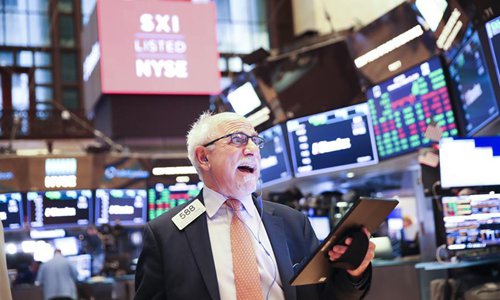HOME >> BUSINESS
Energetic Monday is nothing but a cold comfort as M&A slump is likely to continue
Source:Global Times Published: 2019/11/27 20:23:40

A trader works at the New York Stock Exchange in New York, the United States, on Oct. 30, 2019. U.S. stocks ended higher on Wednesday. The Dow rose 0.43 percent to 27,186.69, the S&P 500 increased 0.33 percent to 3,046.77, and the Nasdaq climbed 0.33 percent to 8,303.98. (Xinhua/Wang Ying)
Monday is statistically the most common day for heart attacks. Bankers' pulses would have been particularly elevated this week, with over $70 billion of deals announced worldwide. Yet the excitement will probably prove temporary. Mergers and acquisitions are in a lull compared with recent years, and a sustained pickup seems unlikely.US broker Charles Schwab on Monday unveiled an all-share deal with TD Ameritrade - worth almost $30 billion including debt, based on Refinitiv data. LVMH is buying Tiffany & Co at a near-$17 billion enterprise value. Meanwhile, a raft of below-$10 billion acquisitions were announced by pharmaceutical group Novartis, ticketing group Viagogo and others.
Yet the busy day is an outlier in an otherwise depressing trend. About $3.7 trillion of deals were announced in the last 12 months - 13 percent lower than a year earlier, according to Refinitiv.
Volumes have fallen even as stock markets reach record highs, breaking the long-term link between deal-making and equity market performance, and suggesting that executives are less optimistic about their businesses than shareholders. Boston Consulting Group's data shows they are also paying less: the average multiple of EBITDA at which companies sell fell to 13 times in the first half of 2019, down from 13.7 times in 2018.
And not all deals smack of corporate exuberance. True, LVMH is paying a rich 16.6 times EBITDA for Tiffany. But other couplings look more defensive. Stockbrokers like Charles Schwab are under pressure from low-cost upstarts. Another big upcoming deal, between Peugeot and Fiat Chrysler Automobiles, was driven by slowing auto sales and the need to build costly low-emissions engines.
It's a tricky time for making bold strategic bets. Persistent protectionist tensions between the US, China and Europe are making chief executives nervous. Meanwhile, international bodies such as the OECD have been warning of weak global growth in the coming years. Add to that a US presidential election next year, and any bankers expecting a sustained boom are probably guilty of wishful thinking.
The authors are Liam Proud and Dasha Afanasieva, Reuters Breakingviews columnists. The article was first published on Reuters Breakingviews. bizopinion@globaltimes.com.cn
Posted in: INSIDER'S EYE